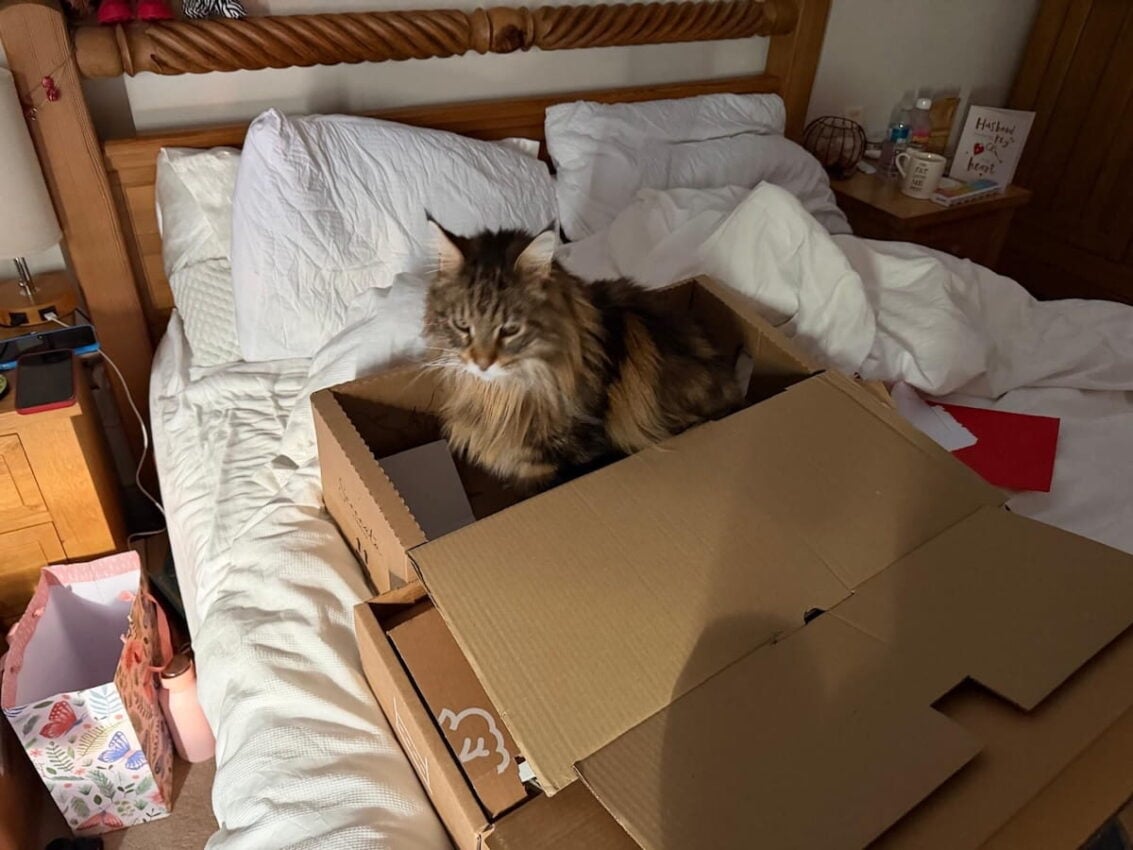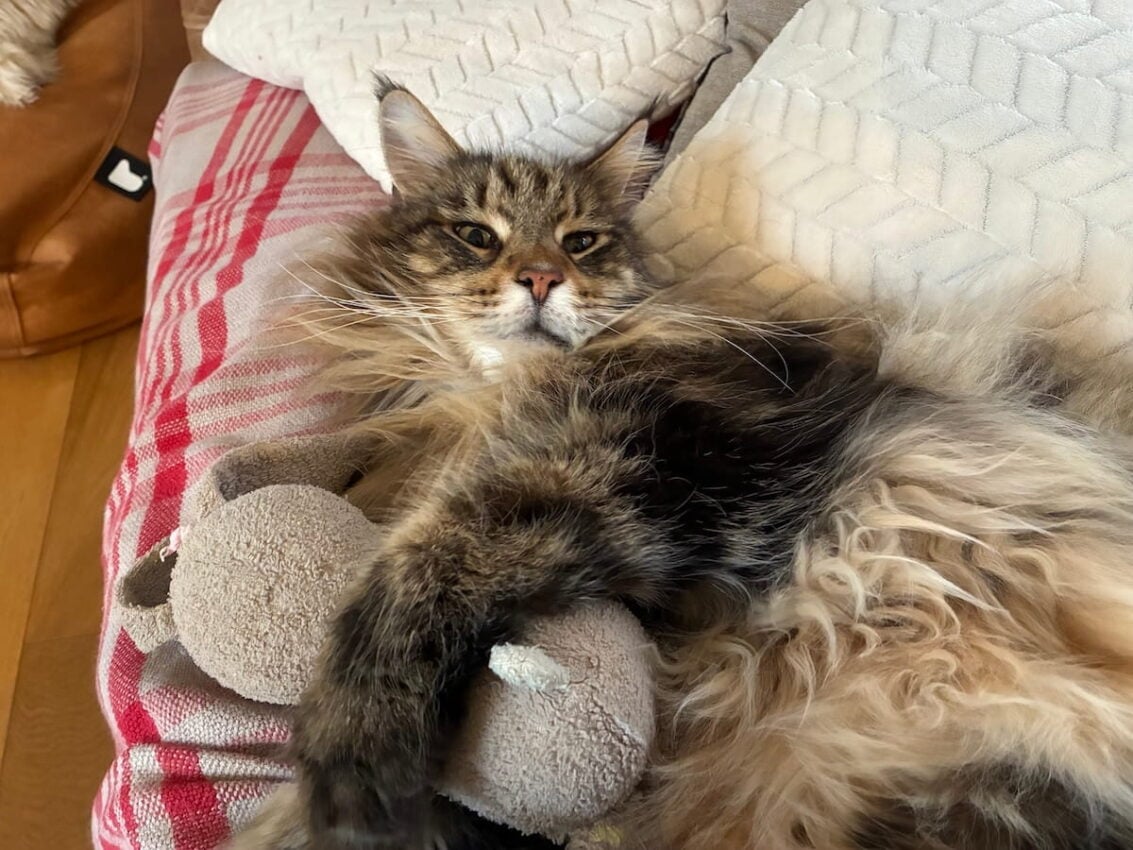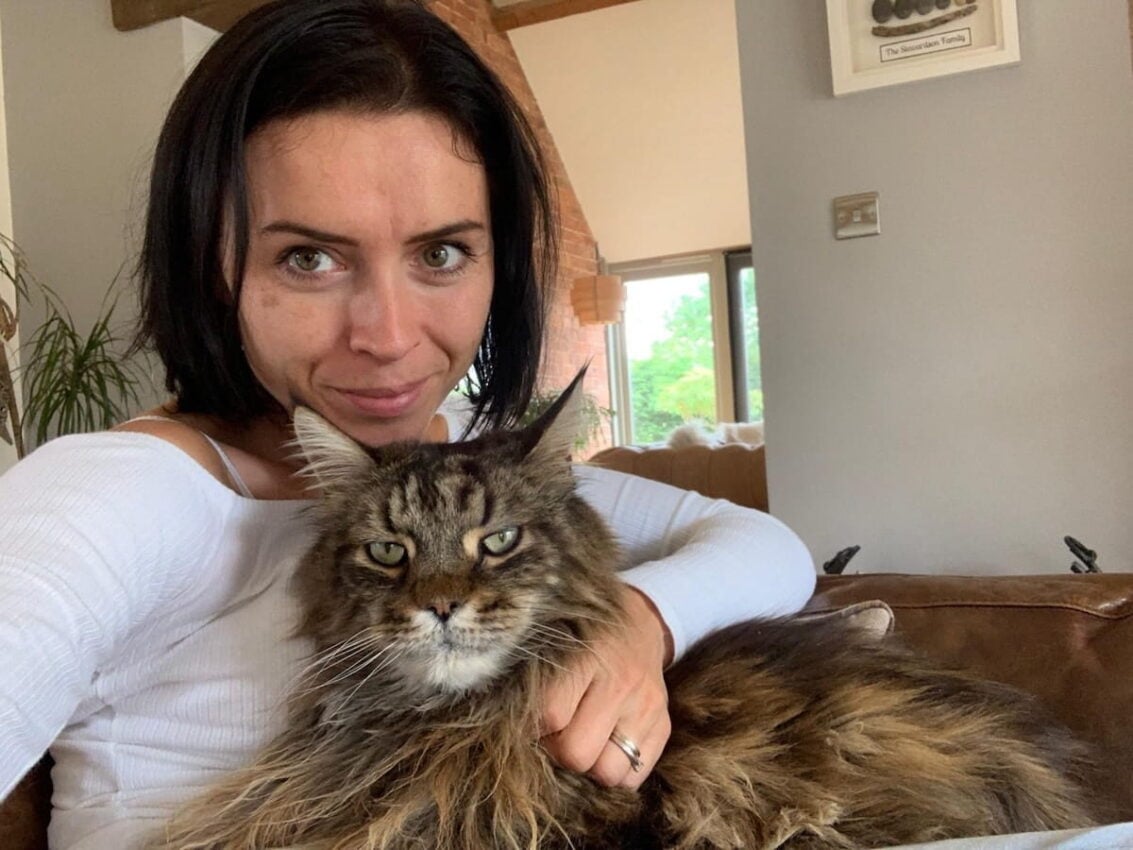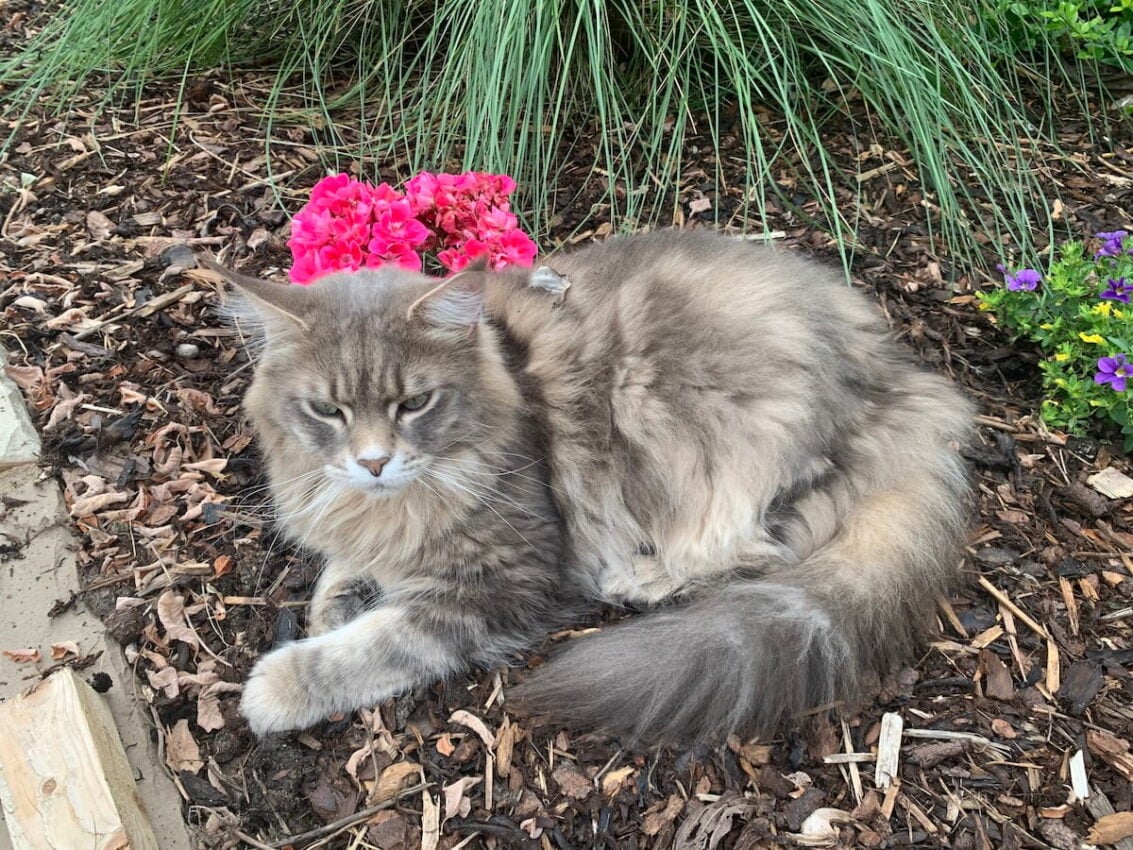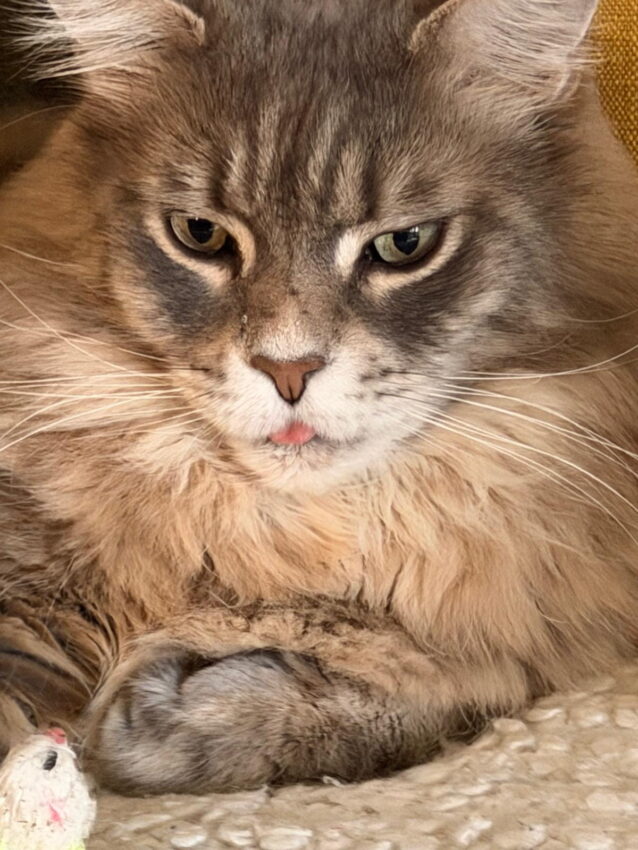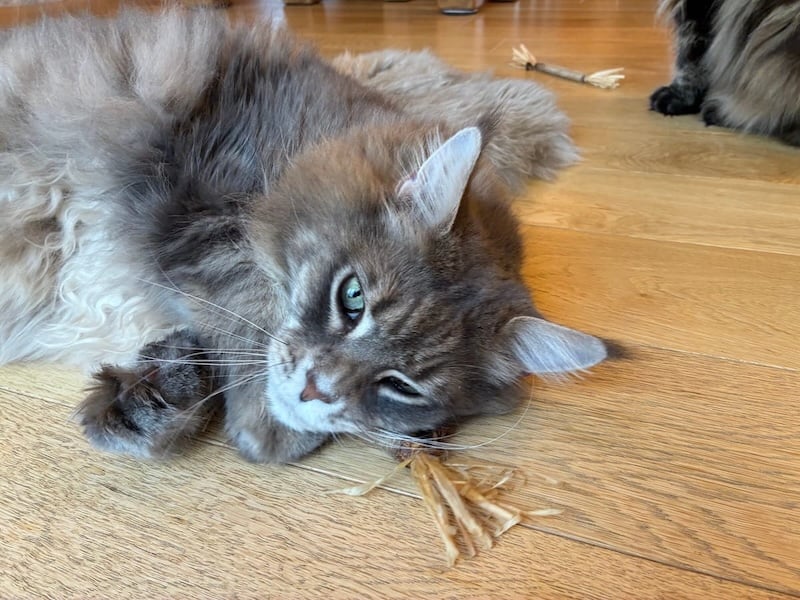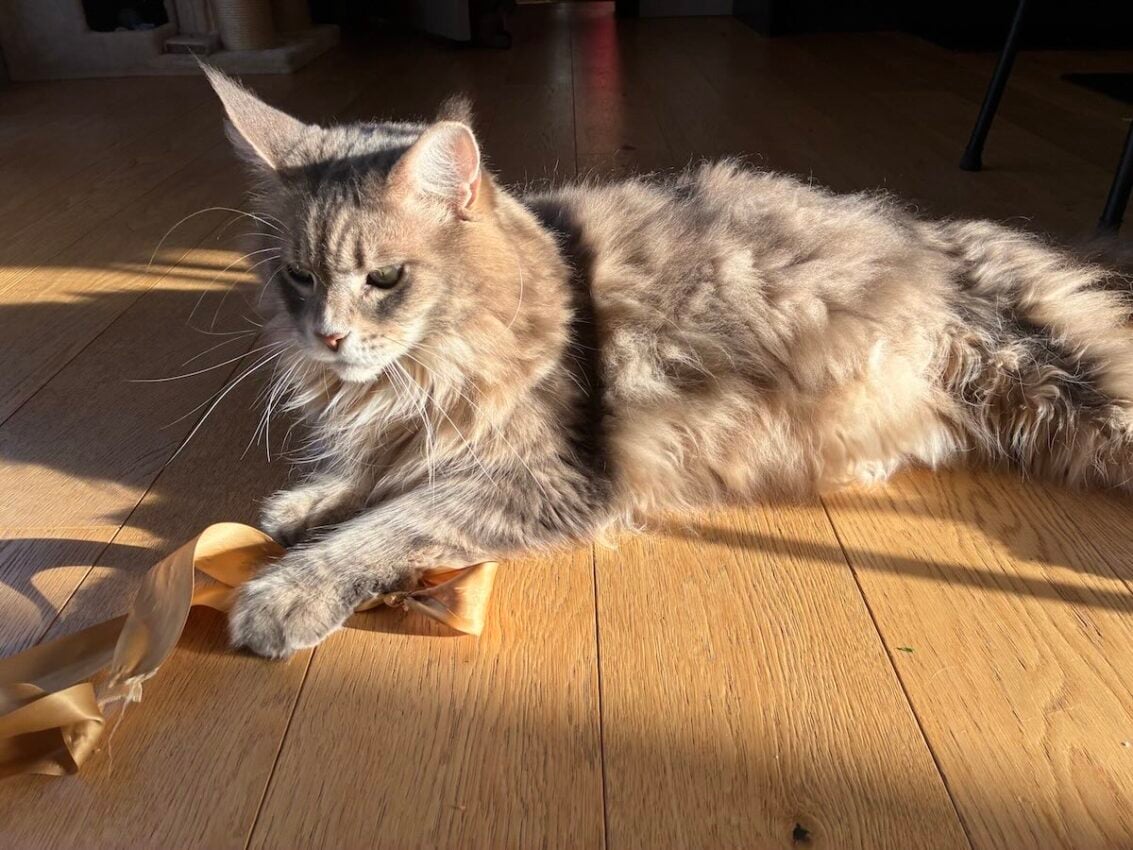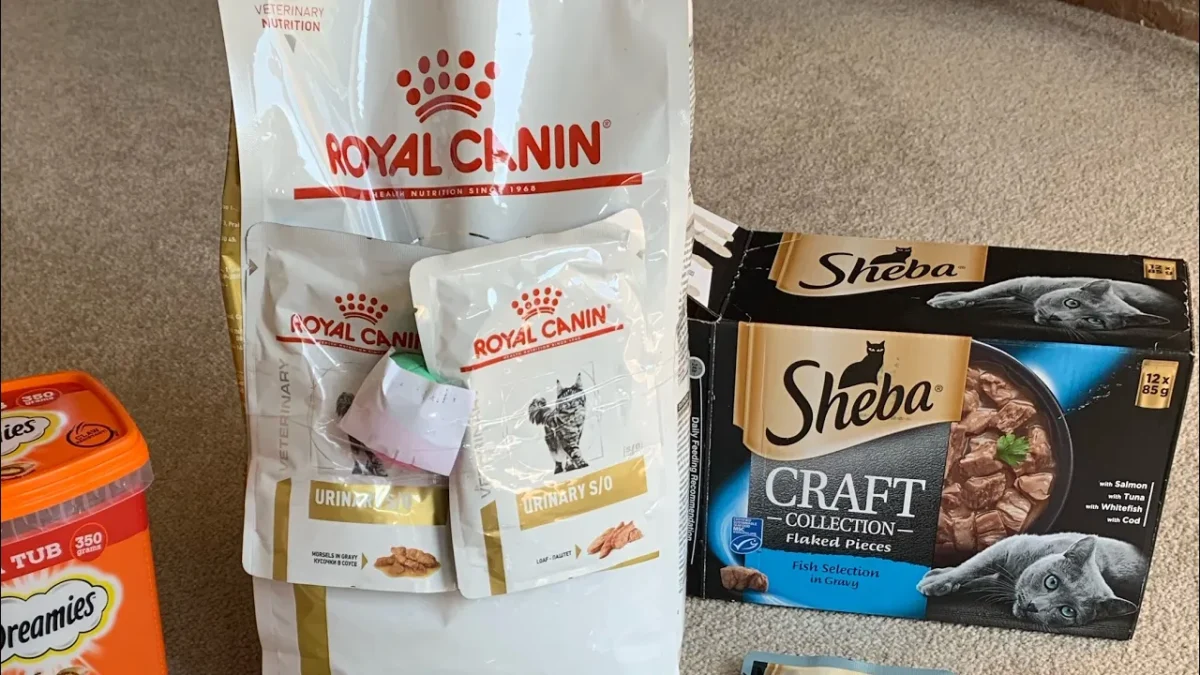How Much Do Maine Coon Cats Eat? (Daily Calories, Portions, And Feeding By Age)

Maine Coon cats typically eat more than the average domestic cat, but their feeding needs are not solely based on size. Age, metabolism, activity level, neuter status, and health all influence how much food they need each day.
Because Maine Coons grow slowly and reach full size at around 3-4 years old, their feeding requirements change more dramatically over time than those of most other breeds.
This guide focuses specifically on:
- Daily calorie needs
- Portion sizes
- Feeding amounts by age
- Real-life feeding expectations
If you’re still deciding what to feed (wet vs dry, urinary diets, raw safety, or life-stage choices), start with the main diet hub here:
How Much Do Maine Coon Cats Eat? (Daily Calories, Portions, And Feeding By Age).
Average Daily Calorie Needs For Maine Coons
Veterinary nutrition sources such as the National Research Council (NRC) and WSAVA recommend that adult cats typically require:
- 20-30 calories per pound (45-65 kcal per kg) per day
Larger, active cats may need more.
Estimated Daily Calorie Needs
| Weight | Calories Per Day |
|---|---|
| 10 lbs (4.5 kg) | 200-300 kcal |
| 12 lbs (5.4 kg) | 240-360 kcal |
| 15 lbs (6.8 kg) | 300-450 kcal |
| 18 lbs (8.2 kg) | 360-540 kcal |
| 20 lbs (9 kg) | 400-600 kcal |
| 22 lbs (10 kg) | 440-660 kcal |
These are starting estimates. Some Maine Coons naturally run lean and require higher calorie intake to maintain weight.
Feeding Volume Table – Kitten To Adult (Royal Canin Urinary As Baseline)
These amounts are starting estimates, not rules – two Maine Coons of the same weight can need different portions depending on frame size, muscle mass, neuter status, and activity.
| Age | Typical Weight | Daily Dry Food | Frequent Feeding | Notes |
|---|---|---|---|---|
| 8-12 weeks | 1.5-2.5 lb | 40-60 g (½-¾ cup) | 3-4 small meals | Rapid growth phase |
| 3-5 months | 2.5-6 lb | 60-100 g (¾-1⅓ cups) | 3 meals | Protein & energy high |
| 6-9 months | 6-10 lb | 100-140 g (1⅓-1¾ cups) | 2-3 meals | Lean-body development |
| 10-12 months | 10-14 lb | 140-180 g (1¾-2¼ cups) | 2 meals | Near adult size |
| 12-18 months | 14-18 lb | 170-210 g (2¼-2¾ cups) | 2 meals | Adjust per body condition |
| Adult (18+ mo) | 15-20+ lb | 170-220 g (2¼-3 cups) | 2 meals | Active adult, maintain weight |
💡 Notes:
- These figures are approximations based on recommended amounts for Royal Canin formulas. Adjust ±10-15% based on your cat’s activity and body condition.
- Use a digital kitchen scale for precise grams, then adjust your measuring cups accordingly.
Feeding By Age & Life Stage
Maine Coon cats grow differently from most other breeds; their growth period can continue until 3-5 years of age, and their nutritional needs change substantially over time. Use the table below as a guideline when planning meals:
| Life Stage | Typical Weight | Daily Calories (kcal) | Feed Frequency |
|---|---|---|---|
| Kitten (0-4 months) | ~1-5 kg | High energy – often 300–450+ | 4 meals/day |
| Junior (4-12 months) | ~4-10 kg | ~350-600 | 3 meals/day |
| Young Adult (1-3 yrs) | ~8-12+ kg | ~350-600+ | 2 meals/day |
| Adult (3-7 yrs) | ~8-13+ kg | ~280-600 | 2 meals/day |
| Senior (7+ yrs) | Varies | ~250-550 | 2 small meals |
These are starting points – your cat’s body condition, activity level, and metabolism will affect requirements. Adjust gradually and re-assess every 1-2 weeks.
Maine Coons are often described as “big eaters,” but appetite isn’t the same as needing more food. Some cats are food-motivated, bored, stressed, or under-stimulated and will act hungry even when calorie needs are already met.
Feeding decisions should be based on body condition and weekly trends, not begging behaviour.
Maine Coon Kitten Feeding Guide (0-5 Years)
Maine Coon kittens grow longer than other breeds, which means they require specialised, high-energy nutrition for much longer.
Feeding stages:
- 0-4 months: high-calorie kitten food, 4 meals/day
- 4-12 months: high-protein kitten food, 3–4 meals/day
- 12-18 months: transition to “junior” or “high-protein adult” food
- 18 months – 5 years: maintain steady growth; avoid early switch to low-calorie diets
Kittens need:
- Higher protein
- Higher fat
- More frequent meals
- DHA for brain development
- Extra hydration
Read more:
How Often To Feed A Maine Coon
Feeding Frequency By Life Stage
| Life Stage | Feed Frequency |
|---|---|
| 8-12 weeks | 3-4 times/day |
| 3-6 months | 3 times/day |
| 6-12 months | 2-3 times/day |
| Adult | 2 times/day |
| Seniors | 2 smaller meals |
Why this matters:
Maine Coons have big appetites but slow metabolisms after maturity. Multiple small meals help manage:
✔ Satiety
✔ Digestion
✔ Urinary health
✔ Weight control
Senior Maine Coon Nutrition (7+ Years): What Changes And What Stays The Same
Senior Maine Coons don’t automatically need a “senior food”, but they do benefit from tighter monitoring. Appetite, digestion, hydration, and muscle maintenance matter more than ever. Many seniors do better with two smaller meals (or split meals) and a close eye on weight trends, dental comfort, and litter tray changes.
If a senior starts losing weight, don’t assume “age”
Real-Life Maine Coon Feeding Examples
One thing we learned from owning three Maine Coons is that no two cats eat the same way, even when they live in the same home.
- Mika reached about 22 lbs and naturally eats the most.
- Pippin was around 20 lbs and sat comfortably in the middle.
- Bali has a naturally slender frame and stayed closer to 18 lbs.
All three:
- Reached full size at around four years old
- Ate similar types of food
- Required different portion sizes due to body type
Yet their portion needs were very different.
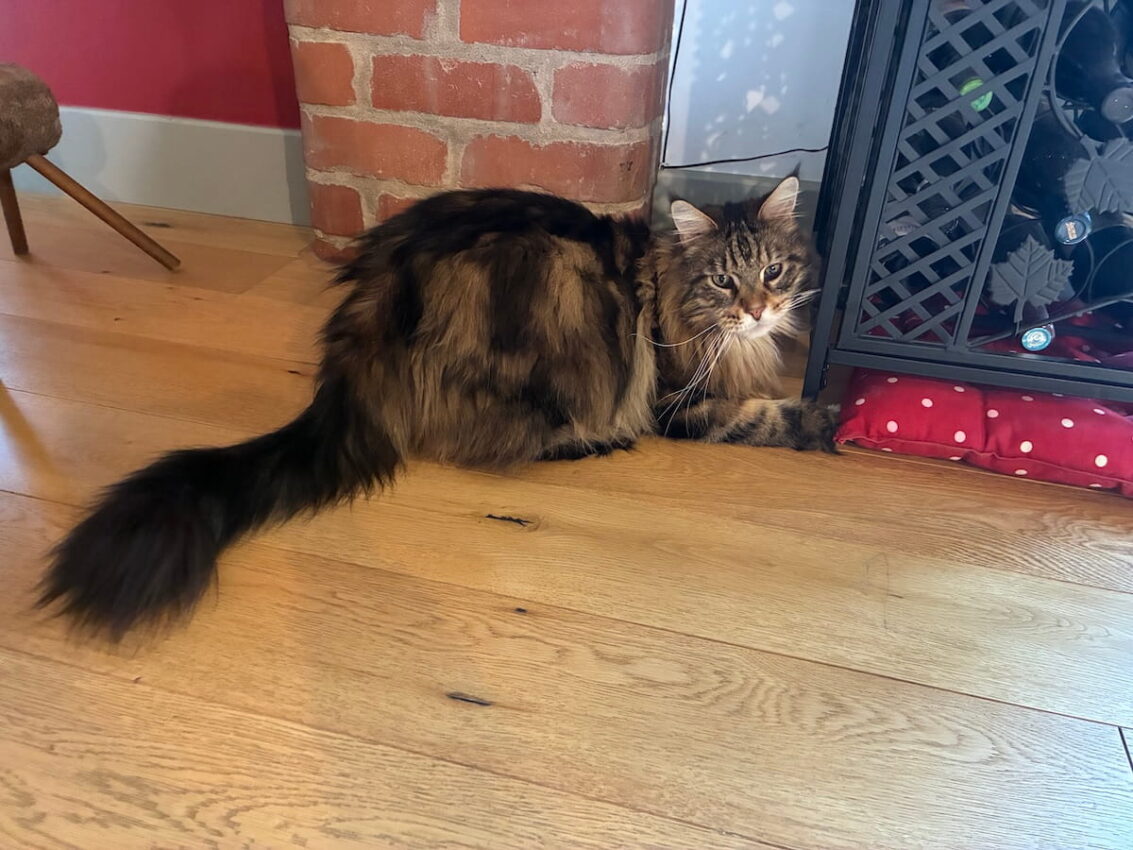
Mika’s Fast Eating And Weekly Vomiting
Mika has always had a strong relationship with food. We suspect this comes from his early life before we adopted him, because he behaves as if food might disappear.
Even after 3.5 years in a stable home where food is always available:
- He still eats dry food very quickly
- He often vomits it back up about once a week
- The behaviour has improved, but never fully disappeared
We use an automatic feeder that dispenses food at regular times, and the cats always have access to food. Yet all three of them:
- Come running the moment they hear the dispenser
- Eat enthusiastically when fresh biscuits appear
It may simply be that they prefer the smell and texture of freshly dispensed food, even though food is always available.
Pippin And Human Food Curiosity
Pippin, whom we raised from a kitten, had a very different feeding personality.
He:
- Was extremely curious about human food
- Would explore countertops at night
- Tried to sample anything left out
We quickly learned not to leave food unattended, as he would happily investigate it! … For instance, I once found him merrily tucking into my chicken madras on the dinner table, whilst I’d left the room to go to the toilet!! That was the moment I discovered he enjoys curry!!
Bali and Mika, on the other hand, do not show this behaviour.
However, Bali does have a sweet tooth:
- If the children leave yoghurt pots unattended, he will try to lick them clean!
This highlights how feeding behaviours can differ widely, even within the same breed.
What Our Maine Coons Eat
All three of our cats eat:
- Royal Canin urinary dry food
- The moderate-calorie version for weight control
We switched Mika to the moderate-calorie formula after he started gaining excess weight.
They also enjoy:
- Royal Canin urinary wet food
- Fed occasionally as part of a mixed feeding routine
This combination has helped:
- Maintain healthy weights
- Prevent urinary issues
- Keep feeding routines consistent
How Much Food Does A Maine Coon Eat Per Day?
The exact amount depends on the calorie density of the food. Always check the label, as different brands vary widely.
Typical Daily Portions (Adult Maine Coon)
Dry food only
- ½ to 1¼ cups per day
(Depending on calorie content)
Wet food only
- 2-4 standard 85 g (3 oz) cans per day
Mixed feeding
- 1-2 cans wet food
- Plus ¼-½ cup dry food
Large, muscular males may need more.
Feeding Amounts By Life Stage
Because Maine Coons mature slowly, their feeding needs change over several years.
Maine Coon Kittens (2-6 Months)
During this phase, growth is rapid and calorie needs are high.
Veterinary guidance from the American Animal Hospital Association (AAHA) suggests kittens may require 2-3 times the calories of adult cats per pound of body weight.
Typical intake:
- 250-350 calories per day
- Sometimes more during growth spurts
Feeding tips:
- Feed 3-4 meals daily
- Use high-quality kitten food
- Allow slightly larger portions during rapid growth
Maine Coon kittens often appear lean and leggy. This is normal.
Junior Maine Coons (6-18 Months)
Growth continues steadily during this period.
Typical intake:
- 300-500 calories per day
- Large males may need more
Feeding tips:
- 2-3 meals per day
- Continue kitten or growth-formula food
- Weigh monthly
Young Adults (18 Months-4 Years)
Maine Coons often continue filling out until around age four.
Typical intake:
- 350-600 calories per day
- Large males may exceed this
Feeding tips:
- Transition gradually to adult food
- Feed twice daily
- Adjust portions based on body condition
All three of our Maine Coons reached full size at around four years old, which aligns with breeder and veterinary expectations for the breed.
Senior Maine Coons (7+ Years)
Older cats may:
- Burn fewer calories
- Lose muscle mass
- Become less active
Typical intake:
- 300-500 calories per day
- Adjust based on health and activity
Senior cats should be weighed more frequently, as sudden weight loss can indicate illness.
How Often Should You Feed A Maine Coon?
Recommended feeding frequency
| Age | Meals Per Day |
|---|---|
| 2-6 months | 3-4 meals |
| 6-18 months | 2-3 meals |
| Adults | 2 meals |
| Seniors | 2 smaller meals |
Free-feeding dry food is common, but it can lead to weight gain in less active indoor cats.
Signs You’re Feeding The Right Amount
Your Maine Coon is likely eating the correct amount if:
- You can feel the ribs with gentle pressure
- There is a visible waist from above
- Weight remains stable
- Energy levels are normal
Veterinary body condition scoring systems, such as those from the World Small Animal Veterinary Association, recommend maintaining cats at a Body Condition Score of 4-5 out of 9.
Signs You’re Feeding Too Much
- No visible waist
- Fat pad under the belly
- Reduced activity
- Gradual weight gain
Signs You’re Feeding Too Little
- Visible ribs or spine
- Sudden weight loss
- Constant hunger
- Lethargy
Sudden weight changes should always be checked by a vet.
How To Adjust Portion Sizes
Increase food if your cat:
- Is underweight
- Very active
- Still growing
Reduce food if your cat:
- Is gaining excess weight
- Has become less active
- Was recently neutered
Make all feeding changes gradually over 7-10 days.
Quick Maine Coon Feeding Guide
| Life Stage | Meals Per Day | Daily Calories |
|---|---|---|
| Kitten (2-6 months) | 3-4 | 250-350 kcal |
| Junior (6-18 months) | 2-3 | 300-500 kcal |
| Young adult (18 months-4 years) | 2 | 350-600 kcal |
| Senior (7+ years) | 2 | 300-500 kcal |
Final Thoughts
Maine Coons generally eat more than standard domestic cats because of their:
- Larger body size
- Slower growth rate
- Higher muscle mass
However, there is no universal portion size. The right amount is the one that:
- Maintains a healthy body shape
- Keeps your cat energetic
- Prevents sudden weight changes
For a deeper explanation of food types, ingredients, and feeding strategies, visit the full Maine Coon diet and nutrition guide.
Sources
- National Research Council. Nutrient Requirements of Dogs and Cats.
- World Small Animal Veterinary Association (WSAVA) Global Nutrition Guidelines.
- American Animal Hospital Association (AAHA) Feline Life Stage Guidelines.
- Association of American Feed Control Officials (AAFCO) Cat Feeding Recommendations.

